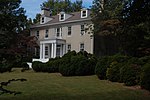Carpenter Point, Maryland
Cecil County, Maryland geography stubsMaryland populated places on the Chesapeake BayUnincorporated communities in Cecil County, MarylandUnincorporated communities in MarylandUse mdy dates from July 2023
Carpenter's Point is an unincorporated community in Cecil County, Maryland, United States. Carpenter Point was the site of the first permanent settlement in Cecil County, established on July 20, 1658, when William Carpenter patented 400 acres (1.6 km2) of land called Anna Catherine Neck, abutting Bay Head Creek, now Principio Creek; Simon Carpenter was assigned this tract of land in 1662. On June 7, 1674, a court was held at the house of Francis Wright at Carpenter’s Point. A painting by the noted painter James Peale titled “The Ramsay-Polk Family at Carpenter’s Point, Cecil County, Maryland” shows the landing in the background in the 18th century.
Excerpt from the Wikipedia article Carpenter Point, Maryland (License: CC BY-SA 3.0, Authors).Carpenter Point, Maryland
Carpenters Point Loop,
Geographical coordinates (GPS) Address Nearby Places Show on map
Geographical coordinates (GPS)
| Latitude | Longitude |
|---|---|
| N 39.544166666667 ° | E -76.006666666667 ° |
Address
Carpenters Point Loop 1599
21903
Maryland, United States
Open on Google Maps









